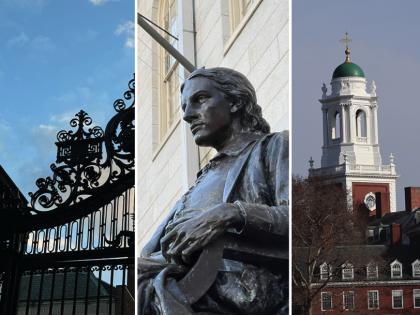The Supreme Court is set to consider how military recruiting may be conducted on campuses when the armed forces’ “Don’t ask, don’t tell” policy regarding homosexuals conflicts with schools’ insistence on nondiscrimination, including on the basis of sexual orientation. The conflicting policies became especially consequential in 2002, when the government insisted on full, equal access for recruiting at Harvard Law School (HLS) and other law schools, threatening under the federal Solomon Amendment to withhold government research funds from universities that did not comply. Harvard receives about $500 million of such revenue annually.
In 2003, a majority of HLS professors asked President Lawrence H. Summers to join a lawsuit challenging the constitutionality of the amendment brought by the Forum for Academic and Institutional Rights, a coalition of law schools. Summers determined that although the underlying standard for military service “offends ideals of nondiscrimination and individual dignity,” the University would not pursue litigation to effect change. A majority of HLS faculty, including Dean Elena Kagan, then filed a brief supporting the challenge, as did HLS Lambda, a student group (see “Military Recruiting: The Lawsuits,” March-April 2004, page 74).
A ruling by the Third Circuit Court of Appeals, issued November 29, enjoined enforcement of the Solomon Amendment. The court held that the law violated schools’ free-speech right not to associate with groups whose nondiscrimination policies violate their own. It also raised the issue of schools being compelled to provide implicit support to a discriminatory message inconsistent with their own standards of fairness.
The next day, Kagan reinstated HLS’s “prior policy on employers’ use of our Office of Career Services,” enabling the office to enforce the school’s policy of “nondiscrimination without exception…. I am gratified by this result,” Kagan’s statement continued, “and I look forward to the time when all law students will have the opportunity to pursue any legal career they desire.” In practical terms, military recruiting can continue at the invitation of student groups, but not formally through the career-services office.
In February, the Justice Department asked the U.S. Supreme Court to reverse the Third Circuit ruling. The justices agreed to hear the case during the term that begins in October. In the meantime, congressional supporters of the Solomon Amendment continue to back it; in authorizing the Pentagon’s budget for fiscal year 2006, the House of Representatives on May 25 voted 336 to 92 to require the secretary of defense to list colleges and universities that do not provide equal access to military recruiters, and to express the “sense of Congress” that those schools be denied funds.








